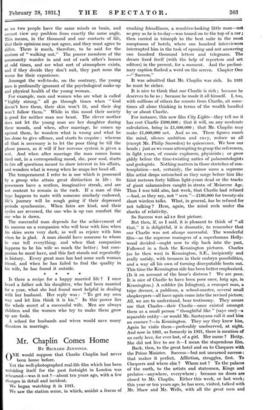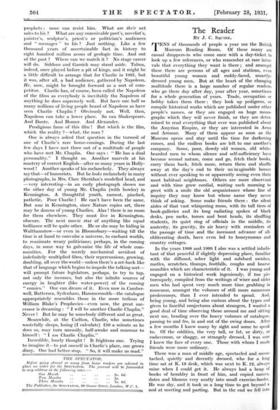Mr. Chaplin Comes Home
BY RICHARD JENNINGS.
(INE would suppose that Charlie Chaplin had never been home before.
Yet the well-photographed real-life film which has been unfolding itself for the past fortnight in London was rehearsed—was it not ?—about ten years ago, with a few changes in detail and incident.
We began watching it in 1921. We saw the station scene, in which, amidst a fracas of crushing friendliness, a sensitive-looking little man—not so grey as he is to-day—was tossed on to the top of a car ; then carried in triumph to the best suite in the most sumptuous of hotels, where one hundred interviewers interrupted him in the task of opening and not answering one hundred thousand letters and telegrams. The dream fixed itself (with the help of reporters and art editors) in the present, for a moment. And the prelimi- nary caption flashed a word on the screen. Chapter One —" Success."
It was admitted that Mr. Chaplin was rich. In 1931 he must be richer.
It is nice to think that our Charlie is rich ; because he deserves to be so ; because he made it all himself. I, too, with millions of others far remote from Charlie, sit some- times all alone thinking in terms of the wealth handled by or about Charlie.
For instance, this new film City Lights—they tell me it has cost Charlie £300,000; that it will, on any moderate calculation, bring in £1,600,000; that Mr. Chaplin may make £1,000,000 net. And so on. These figures numb the mind, silence ambition and envy, reduce us all (except Mr. Philip Snowden) to quiescence. We bow our heads ; just as we cease attempting to grasp the references, in light years, of cosmic explorers, physicists ; or grow giddy before the time-twisting antics of palaeontologists and geologists. Nothing matters in those stretches of con- templation—not, certainly, the minor sums a supreme film artist drops untouched as they surge before him like faint meteors forty billion light-years dead or the tracks of giant salamanders caught in strata of Meiocene Age. Thus I was told also, last week, that Charlie had refused —had, as they say, not "seen "--E130,000 for twenty-six short wireless talks. What, in general, has he refused for not talking ? Here, again, the mind reels under the shocks of relativity.
So Success was ai a e first picture.
But then, if, as 1 said, it is pleasant to think of "all that," it is delightful, it is dramatic, to remember that our Charlie was not always successful. The wonderful fihn—so the supreme managers of a superhuman Holly- wood decided—ought now to slip back into the past. Followed in a flash the Kennington pictures. Charles (as he then was) in Kennington, S.E., incipiently and really untidy, with trousers in their embryo possibilities, and a way all his own of turning disreputable boots out. This time the Kennington side has been better emphasized. (Is it on account of the hour's distress ? We are poor. It is nice of Charlie to have been poor once, lorig ago, in Kennington.) A cobbler (in Islington), a crumpet man, a tripe dresser, a publican, a school-master, several small shopkeepers—all have again come into the revised picture. All, we are to understand, bear testimony. They assure use that Charles—their Charlie—once existed amongst them as a small person "thoughtful like" (says one)—a separable entity—or would Mr. Santayana call it and him an essence ?—in Kennington. They say they knew him. Again he visits them—preferably unobserved, at night. And now in 1931, as formerly in 1921, there is mention of an early love, for ever lost, of a girl. Her name ? Hetty. She did not live to see it—I mean the stupendous film.
Back, then, to the great hotel and on to Chequers with the Prime Minister. Success—but not unearned success : that makes it perfect. Affliction, struggles, first. To Chequers and where else ? Where not ? To the palaces of the earth, to the artists and statesmen, Kings and prelates—anywhere, everywhere ; because no doors are closed to Mr. Chaplin. Either this week, or last week; this year or ten years ago, he has seen, visited, talked with Mr. Shaw and Mr. Wells, with all the great men and prophets : none can resist him. , What are their net sales to his ? What are any conceivable poet's, novelist's, painter's, sculptor's, priest's or politician's audiences and " messages " to his ? Just nothing. Like a few thousand years of ascertainable fact in history to eight hundred million aeons of geologic time. And out of the past ? Where can we match it ? No stage career will do. Siddons and Garrick may stand aside. Talma, indeed, once played before a pit of kings, and it might be a little difficult to arrange that for Charlie in 1931, but a was, after all, a bad audience, gathered by Napoleon.
lie, now, might be brought forward as a sort of com- petitor. Charlie has, of course, been called the Napoleon of the films as everybody is inevitably the Napoleon of anything he does supremely well. But have one half so many millions of living people heard of Napoleon as have seen Charlie Chaplin ? Obviously not. Well, then, Napoleon can take a lower place. So can Shakespeare. And Dante. And Homer. And Alexander.
Prodigious fame of this film ! But which is the film, which the reality ?—what, the man ?
One is always asked that question in the turmoil of one of Charlie's rare home-comings. During the last few days I have met three out of a multitude of people who have met Mr. Chaplin. One says : "He has a dual personality." I thought so. Another marvels at his mastery of correct English—after so many years in Holly- wood ! Another speaks of his melancholy. They always say that—of humorists. But he looks melancholy in many photographs, in Mrs. Clare Sheridan's modelled head, and —very interesting—in an early photograph shown me the other day of young Mr. Chaplin (with bowler) in Kennington. A thoughtful youth, earnest, pinched, pathetic. Poor Charlie ! He can't have been the same. But now in Kennington, since Nature copies art, there may be dozens of young Charlies. Alas ! there is no room for them elsewhere. They must live in Kennington, obscure. The next movie star of anything like equal brilliance will be quite other. He or she may be hiding in Walthamstow—or even in Bloomsbury—waiting till the time is at hand to convulse a universe, to enchant worlds, to reanimate weary politicians; perhaps, in the coming days, in some way to galvanize the life of whole com- munities. For the merely mechanical accident of indefinitely multiplied films, their repercussions, growing, doubling, all over the world—unless there's a set-back like that of language which begins to impede the talking sort— will prompt future legislators, perhaps, to try to tap, not only the incomes, but also the infinite sources of energy in laughter (like water-power) of the coming "comics." One can dream of it. Even now in Camber- well, Battersea, Sydenham, Hammersmith—the catalogue appropriately resembles those in the more tedious of William Blake's Prophecies—even now, the great suc- cessor is dreaming : "I will be another Charlie Chaplin." Never ! But he may be somebody different and as great.
Meanwhile, at the Carlton, Charlie, who sometimes wastefully sleeps, losing (I calculate) £10 a minute as he does so, may turn uneasily, half-awake and murmur to himself : "I am Charlie Chaplin."
Incredible, lonely thought ! It frightens one. Trying to imagine it—to put oneself in Charlie's place, one grows dizzy. One had better stop. "So, it will make us mad."












































 Previous page
Previous page